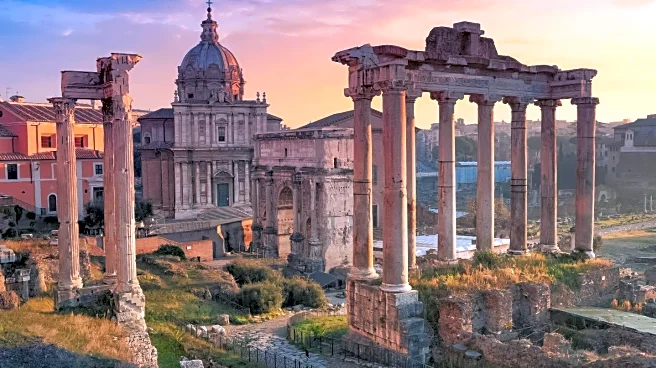What's Happening?
Six Senses Rome, the first urban property of the eco-wellness-centric ultraluxury brand by IHG, has opened in the heart of Rome's UNESCO-protected city center. The hotel is located in the Palazzo Salviati Cesi Mellini, a historical building near the Pantheon and Trevi Fountain. The project blends Roman Renaissance architecture with contemporary design, focusing on sustainability and local culture. The restoration preserved key historical features, including a fourth-century baptismal bath and a monumental staircase, while integrating modern amenities. The hotel offers a unique Roman Baths experience in its spa and locally sourced dining options, aiming to provide guests with an authentic connection to Rome.
Why It's Important?
The opening of Six Senses Rome highlights a growing trend in luxury hospitality that emphasizes historical preservation and sustainability. By integrating local culture and sustainable practices, the hotel not only enhances guest experience but also supports the local community. This approach reflects a broader shift in the industry towards responsible tourism, where luxury brands are increasingly committed to environmental stewardship and cultural heritage. The hotel's success could influence other luxury properties to adopt similar practices, potentially leading to more sustainable and culturally immersive travel experiences.
What's Next?
Six Senses Rome is expected to continue its integration into the local community through various initiatives, including heritage preservation and sustainability programs. The hotel plans to offer interactive workshops and educational talks focused on environmental conservation, further engaging both guests and locals. As the property establishes itself within Rome's luxury hospitality landscape, it may inspire other hotels to adopt similar strategies, fostering a more sustainable and culturally connected tourism industry.
Beyond the Headlines
The hotel's commitment to preserving Rome's cultural heritage and promoting sustainability could have long-term implications for the luxury hospitality industry. By setting a precedent for responsible tourism, Six Senses Rome may encourage other properties to prioritize environmental and cultural stewardship. This shift could lead to a more sustainable and ethically conscious approach to luxury travel, benefiting both local communities and the global tourism industry.











